 Libri di Daniel Heller-Roazen su Unilibro.it) Libri di Daniel Heller-Roazen su Unilibro.it)
|
|
2025 |
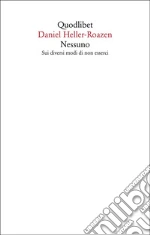 Title :
Nessuno. Sui diversi modi di non esserci
Title :
Nessuno. Sui diversi modi di non esserciAuthor: Heller-Roazen Daniel Publisher: Quodlibet Ci sono molti modi per essere qualcuno, ma, paradossalmente, ce ne sono forse altrettanti per essere Nessuno: dall'assenza fisica, volontaria (come nel caso del Wakefield di Hawthorne, o del Mattia Pascal pirandelliano) o involontaria (il prigioniero di guerra), alla deminutio giuridica di chi - fra la vita presunta e la scomparsa da certificare - viene privato di tutti i diritti (come il servo antico, detto dai romani «senza persona», o come Peter Schlemihl che perse la propria ombra), fino all'assenza ultima, che coincide col decesso, e che da séguito a quegli esseri fuggevoli eppure indimenticabili che sono gli spettri e le «anime morte». Come è consuetudine dei saggi di Daniel Heller-Roazen, anche il presente libro ci accompagna in un coltissimo viaggio fantasmagorico attraverso la letteratura, la filosofia, l'antropologia e il diritto, alla ricerca, stavolta, di qualcosa che non c'è. € 24,00
Scontato: € 22,80
|
|
|
2020 |
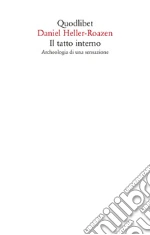 Title :
Il tatto interno. Archeologia di una sensazione
Title :
Il tatto interno. Archeologia di una sensazioneAuthor: Heller-Roazen Daniel Publisher: Quodlibet Cosa vuol dire sentirsi vivi? A questa domanda Daniel Heller-Roazen risponde elaborando l'archeologia di un solo senso, quel «tatto interno mediante il quale percepiamo noi stessi». In venticinque concisi capitoli, che spaziano liberamente dalla cultura antica e medievale a quella moderna, l'autore analizza un insieme di fenomeni esemplari che hanno giocato un ruolo cruciale nella definizione - filosofica, letteraria, psicologica e medica - dell'esistenza animale. Con quest'opera, sensazione e sentimento di sé, sonno e veglia, estetica e anestesia, natura animale e natura umana, coscienza e incoscienza - acquistano un nuovo significato. € 24,00
|
|
|
2019 |
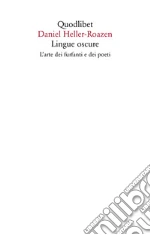 Title :
Lingue oscure. L'arte dei furfanti e dei poeti
Title :
Lingue oscure. L'arte dei furfanti e dei poetiAuthor: Heller-Roazen Daniel Publisher: Quodlibet Sembra incontestabile che il linguaggio serva a comunicare, ma la parola può assolvere anche un'altra funzione: quando è necessario, essa confonde e occulta. Lo sanno gli adulti e i bambini, i filologi e i banditi: tra le facoltà implicite del linguaggio, c'è quella di smontare e ricostruire una lingua per farne un idioma nuovo, sconosciuto, accessibile soltanto a pochi. È dal Quattrocento, in Europa, che si attestano le prime lingue intenzionalmente segrete. Sviluppate da malviventi e briganti, queste si diffusero in tutti i volgari moderni: dal gergo dei banditi francesi al thieves' cant dell'Inghilterra rinascimentale, dal dialetto dei ladri denunciato da Martin Lutero ai furbeschi degli imbroglioni italiani, portoghesi, spagnoli. Ma l'arte di forgiare parole impenetrabili risale molto più indietro nel tempo, e non è sempre stata legata a tali equivoche finalità. In India, nell'antica Grecia e a Roma, in Provenza e in Scandinavia, cantori e scribi si sono appropriati delle lingue intorno a loro e le hanno alterate, non per ingannare, bensì per rivelare e tramandare un'entità sacra: l'idioma degli dèi, del quale i veri maestri - così si diceva - erano i poeti e i sacerdoti. "Lingue oscure" si destreggia tra questi multiformi linguaggi ermetici. Dall'argot criminale al gergo degli spiriti, dal lavoro di Saussure e Jakobson sugli anagrammi e le strutture subliminali nella poesia, fino al codice segreto che il dadaista Tristan Tzara pretendeva di aver scoperto nelle opere di Villon, "Lingue oscure" esplora le arti condivise da furfanti ed enigmisti che seppero giocare a scac € 19,00
|
|
|
1917 |
 Title :
No One's Ways
Title :
No One's WaysAuthor: Heller-Roazen Daniel Publisher: Zone Books € 29,50
|
|
|
2017 |
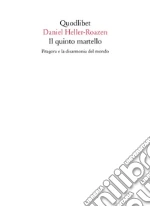 Title :
Il quinto martello. Pitagora e la disarmonia del mondo
Title :
Il quinto martello. Pitagora e la disarmonia del mondoAuthor: Heller-Roazen Daniel Publisher: Quodlibet Passeggiando nei pressi di una fonderia - così si narra - Pitagora ebbe la prima fulminante intuizione circa l'armonia: il suono calibrato che usciva dal luogo lo spinse a entrare e indagarne la natura. Entrato, trovò cinque uomini che impugnavano altrettanti martelli di diverse grandezze. Scoprì così che quattro di quegli utensili, tutt'altro che musicali per loro natura, grazie a ben precise dimensioni, riuscivano a emettere un suono armonico, capace di dilettare l'orecchio oltre ogni aspettativa. Era il primo passo per lo studio dell'armonia sonora e dell'approccio alle leggi che governano la musica. Il quinto di quei martelli invece - punto nodale del discorso dell'autore - venne scartato dalle osservazioni di Pitagora, non essendo egli stato in grado né di misurarlo, né di udirlo distintamente. Cosa indusse Pitagora a questa azione di scarto così ferma e decisa? Il libro parte proprio da questo, ipotizzando che la scelta offra la chiave per la definizione dell'idea stessa dell'armonia. Dal rifiuto del quinto martello, infatti, sarebbe nata la teoria del suono musicale, rifiuto che coincide con il primo assioma della scienza del mondo sensibile. € 20,00
Scontato: € 19,00
|
|
|
1913 |
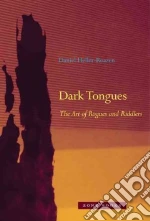 Title :
Dark Tongues
Title :
Dark TonguesAuthor: Heller-Roazen Daniel Publisher: Zone Books In Dark Tongues, Daniel Heller-Roazen offers a sustainedexploration of a perplexing fact that has never received the attention it deserves. Wherever humanbeings share a language, they also strive to make from it something new: a cryptic idiom that willallow them to communicate in secrecy. Secret languages may be playful or serious, as apparentlyimpenetrable as a foreign tongue, or only slightly different from the languages from which theyspring. The first recorded jargons date to the time of the Renaissance in Europe.A varied cast of characters -- lawyers, grammarians, and theologians -- denounced these new forms ofspeech, arguing that they served a single and illegitimate end: crime, plotted in tongues thathonest people could not understand. Before this, in epochs and regions as diverse as archaic Greeceand Rome, medieval Provence and Scandinavia, singers and scribes also invented opaque varieties ofspeech, not to defraud but to reveal and record a divine thing: the language of the gods, whichpoets and priests alone were said to know. Dark Tongues movesamong these hermetic artificial tongues, exploring phenomena as diverse as criminal jargons anddivine speech, Saussure's and Tristan Tzara's work of anagrams, Jakobson's theory of subliminalpoetic patterning, and the secret writing systems of the Biblical copyists and Druids. In its elevensuccinct chapters, Dark Tongues advances a single thesis: that such willfully obscure languages allrest on poetic techniques, which work to play sound and sense against each other. € 25,00
|
|
|
2013 |
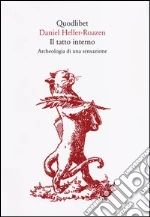 Title :
Il tatto interno. Archeologia di una sensazione
Title :
Il tatto interno. Archeologia di una sensazioneAuthor: Heller-Roazen Daniel Publisher: Quodlibet "L'archeologia della sensazione delineata in questo libro non soltanto getta una nuova luce su alcuni problemi fondamentali nella storia del pensiero occidentale, ma permette di porre con chiarezza un problema su cui filosofi e scienziati non potranno in futuro fare a meno di interrogarsi: qual è il senso col quale, al di qua o al di là della coscienza, sentiamo di esistere?" (Giorgio Agamben). Cosa vuol dire sentirsi vivi? A questa domanda Daniel Heller-Roazen risponde elaborando l'archeologia di un solo senso, quel "tatto interno mediante il quale percepiamo noi stessi". In venticinque concisi capitoli, che spaziano liberamente dalla cultura antica e medievale a quella moderna, l'autore analizza un insieme di fenomeni esemplari che hanno giocato un ruolo cruciale nella definizione - filosofica, letteraria, psicologica e medica - dell'esistenza animale. Con quest'opera, sensazione e sentimento di sé, sonno e veglia, estetica e anestesia, natura animale e natura umana, coscienza e incoscienza - acquistano un nuovo significato. € 26,00
|
|
|
1911 |
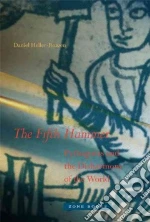 Title :
The Fifth Hammer
Title :
The Fifth HammerAuthor: Heller-Roazen Daniel Publisher: Zone Books An ancient tradition holds that Pythagoras discovered the secrets of harmony within a forge when he came across five men hammering with five hammers, producing a wondrous sound. Four of the five hammers stood in a marvelous set of proportions, harmonizing; but there was also a fifth hammer. Pythagoras saw and heard it, but he could not measure it; nor could he understand its discordant sound. Pythagoras therefore discarded it. What was this hammer, such that Pythagoras chose so decidedly to reject it?Since antiquity, "harmony" has been a name for more than a theory of musical sounds; it has offered a paradigm for the scientific understanding of the natural world. Nature, through harmony, has been transcribed in the ideal signs of mathematics. But, time and again, the transcription has run up against one fundamental limit: something in nature resists being written down, transcribed in a stable set of ideal elements. A fifth hammer, obstinately, continues to sound. In eight chapters, linked together as are the tones of a single scale, The Fifth Hammer explores the sounds and echoes of that troubling percussion as they make themselves felt on the most varied of attempts to understand and represent the natural world. From music to metaphysics, aesthetics to astronomy, and from Plato and Boethius to Kepler, Leibniz, and Kant, this book explores the ways in which the ordering of the sensible world has continued to suggest a reality that no notes or letters can fully transcribe. € 25,00
|
|
|
2010 |
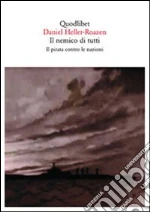 Title :
Il nemico di tutti. Il pirata contro le nazioni
Title :
Il nemico di tutti. Il pirata contro le nazioniAuthor: Heller-Roazen Daniel Publisher: Quodlibet Secondo una celebre affermazione di Cicerone, esistono nemici con i quali si può negoziare, e con cui, ove le circostanze lo consentano, si può stabilire una tregua; ma esiste anche un nemico con il quale i trattati restano lettera morta, e la guerra continua senza fine: questi è il pirata, che gli antichi giuristi consideravano "il nemico di tutti". A partire dalla descrizione ciceroniana dell'avversario, questo libro ricostruisce il mutevole ruolo che la figura del pirata ha svolto nel pensiero giuridico e politico dall'antichità al medioevo, e dall'età moderna alla contemporaneità. Oggi, come sostiene Heller-Roazen, il pirata costituisce la chiave del paradigma contemporaneo dell'avversario universale, persona giuridica e politica di carattere eccezionale, né criminale né nemico, che dimora in una regione extraterritoriale. Contro tale avversario gli Stati possono combattere battaglie straordinarie, implementare strategie politiche e giustificare misure militari in nome della prosperità e della sicurezza. Attingendo ai diversi materiali di numerose discipline - dal diritto alla storia, dalla teoria politica alla letteratura -, iI nemico di tutti fa emergere il paradigma coerente che definisce l'atto di pirateria. € 22,00
|
|
|
2009 |
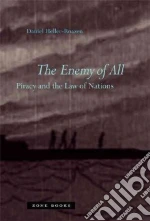 Title :
The Enemy of All
Title :
The Enemy of AllAuthor: Heller-Roazen Daniel Publisher: Zone Books The pirate is the original enemy of humankind. As Cicero famously remarked, there are certain enemies with whom one may negotiate and with whom, circumstances permitting, one may establish a truce. But there is also an enemy with whom treaties are in vain and war remains incessant. This is the pirate, considered by ancient jurists to be "the enemy of all." In this book, Daniel Heller-Roazen reconstructs the shifting place of the pirate in legal and political thought from the ancient to the medieval, modern, and contemporary periods, presenting the philosophical genealogy of a remarkable antagonist. Today, Heller-Roazen argues, the pirate furnishes the key to the contemporary paradigm of the universal foe. This is a legal and political person of exception, neither criminal nor enemy, who inhabits an extra-territorial region. Against such a foe, states may wage extraordinary battles, policing politics and justifying military measures in the name of welfare and security. Heller-Roazen defines piracy by the conjunction of four conditions: a region beyond territorial jurisdiction; agents who may not be identified with an established state; the collapse of the distinction between criminal and political categories; and the transformation of the concept of war. The paradigm of piracy remains in force today. Whenever we hear of regions outside the rule of law in which acts of "indiscriminate aggression" have been committed "against humanity," we must begin to recognize that these are acts of piracy. Often considered part of the distant past, the enemy of all is closer to us today than we may think. Indeed, he may never have been closer. Distributed for Zone Books € 25,90
|
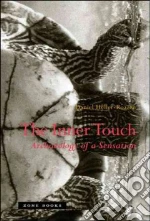 Title :
The Inner Touch
Title :
The Inner TouchAuthor: Heller-Roazen Daniel Publisher: Zone Books The Inner Touch presents the archaeology of a single sense: the sense of being sentient. Aristotle was perhaps the first to define this faculty when in his treatise On the Soul he identified a sensory power, irreducible to the five senses, by which animals perceive that they are perceiving: the simple "sense," as he wrote, "that we are seeing and hearing." After him, thinkers returned, time and again, to define and redefine this curious sensation. The classical Greek and Roman philosophers as well as the medieval Arabic, Hebrew, and Latin thinkers who followed them all investigated a power they called "the common sense," which one ancient author likened to "a kind of inner touch, by which we are able to grasp ourselves." Their many findings were not lost with the waning of the Middle Ages. From Montaigne and Francis Bacon to Locke, Leibniz, and Rousseau, from nineteenth-century psychiatry and neurology to Proust and Walter Benjamin, the writers and thinkers of the modern period have turned knowingly and unknowing to the terms of older traditions in exploring the perception that every sensitive being possesses of its life.The Inner Touch reconstructs and reconsiders the history of this perception. In twenty-five concise chapters that move freely among ancient, medieval, and modern cultures, Daniel Heller-Roazen investigates a set of exemplary phenomena that have played central roles in philosophical, literary, psychological, and medical accounts of the nature of animal existence. Here sensation and self-sensation, sleeping and waking, aesthetics and anesthetics, perception and apperception, animal nature and human nature, consciousness and unconsciousness, all acquire a new meaning.The Inner Touch proposes an original, elegant, and far-reaching philosophical inquiry into a problem that has never been more pressing: what it means to feel that one is alive.Winner of the Aldo and Jeanne Scaglione Prize for Comparative Literary Studies € 22,30
|
|
2008 |
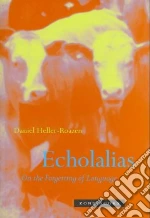 Title :
Echolalias
Title :
EcholaliasAuthor: Heller-Roazen Daniel Publisher: Zone Books Just as speech can be acquired, so can it be lost. Speakers can forget words, phrases, even entire languages they once knew; over the course of time peoples, too, let go of the tongues that were once theirs, as languages disappear and give way to the others that follow them. In Echolalias, Daniel Heller-Roazen reflects on the many forms of linguistic forgetfulness, offering a far-reaching philosophical investigation into the persistence and disappearance of speech. In twenty-one brief chapters, he moves among classical, medieval, and modern culture, exploring the interrelations of speech, writing, memory, and oblivion.Drawing his examples from literature, philosophy, linguistics, theology, and psychoanalysis, Heller-Roazen examines the points at which the transience of speech has become a question in the arts, disciplines, and sciences in which language plays a prominent role. Whether the subject is Ovid, Dante, or modern fiction, classical Arabic literature or the birth of the French language, structuralist linguistics or Freud's writings on aphasia, Heller-Roazen considers with clarity, precision, and insight the forms, the effects, and the ultimate consequences of the forgetting of language. In speech, he argues, destruction and construction often prove inseparable. Among peoples, the disappearance of one language can mark the emergence of another; among individuals, the experience of the passing of speech can lie at the origin of literary, philosophical, and artistic creation.From the infant's prattle to the legacy of Babel, from the holy tongues of Judaism and Islam to the concept of the dead language and the political significance of exiled and endangered languages today, Echolalias traces an elegant, erudite, and original philosophical itinerary, inviting us to reflect in a new way on the nature of the speaking animal who forgets. € 20,50
|
|
|
2007 |
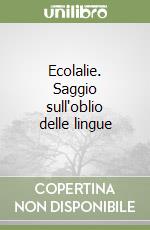 Title :
Ecolalie. Saggio sull'oblio delle lingue
Title :
Ecolalie. Saggio sull'oblio delle lingueAuthor: Heller-Roazen Daniel Publisher: Quodlibet Dal punto di vista medico, l'ecolalia è quel "disturbo che consiste nel ripetere involontariamente parole o frasi pronunciate da altre persone", un fenomeno che, fin dal diciannovesimo secolo, è stato oggetto di studio principalmente della psichiatria. Daniel Heller-Roazen dà a questa patologia un significato inedito, riconducendola alle radici più profonde del linguaggio stesso. Nei ventuno capitoletti del volume, in cui la filosofia sembra ricongiungersi alla lingua del mito e della fiaba, si declina nei modi più inaspettati una tesi di fondo: ogni lingua è l'eco di un'altra, e continua a portarne testimonianza. Radicalizzando, ogni lingua è l'eco di quella babele infantile la cui cancellazione rende possibile la parola. Tale tesi trova riscontro nei territori più diversi: la mitologia, la psicoanalisi, la teologia, la letteratura, la linguistica. Apre una nuova prospettiva sul rapporto fra oralità e scrittura e su facoltà umane come la memoria e l'oblio. E si rivela una chiave di lettura incredibilmente versatile, in un percorso che, in queste ventuno "ecolalie", porta da Ovidio a Dante, da Edgar Allan Poe a Elias Canetti, dalle lingue sacre dell'ebraismo e dell'islam ai dialetti in via di sparizione, dalla lingua materna dei poeti alla lingua ideale dei dotti. € 24,00
Scontato: € 22,80
|
|
|
2000 |
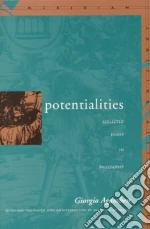 Title :
Potentialities
Title :
PotentialitiesAuthor: Agamben Giorgio, Heller-Roazen Daniel Publisher: Stanford Univ Pr This book collects fifteen major philosophical essays written over a period of more than twenty years by acclaimed Italian philosopher Giorgio Agamben. The volume opens with an introduction in which the editor situates Agamben's work with respect to both the history of philosophy and contemporary European thought. The essays that follow articulate a series of theoretical confrontations with privileged figures in the history of philosophy, politics, and criticism, from Plato to Spinoza, Aristotle to Deleuze, Carl Schmitt to Benjamin, Hegel to Aby Warburg, and Heidegger to Derrida. Three fundamental concepts organize the collection as a whole: language, in the sense not of particular statements but rather the very taking place of speech, the pure fact of language's existence; history, as it appears from a perspective in which tradition, transmission, and memory reach their messianic fulfillment; and potentiality, understood as a fundamental problem of metaphysics, ethics, and the philosophy of language. All these topics converge in the final part of the book, in which Agamben offers an extensive reading of Melville's short story "Bartleby the Scrivener" as a work that puts potentiality and actuality, possibility and reality, in an altogether new light. € 29,90
|
|
|
1999 |
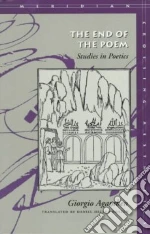 Title :
The End of the Poem
Title :
The End of the PoemAuthor: Agamben Giorgio, Heller-Roazen Daniel (TRN) Publisher: Stanford Univ Pr This book, by one of Italy's most important and original contemporary philosophers, represents a broad, general, and ambitious undertaking?nothing less than an attempt to rethink the nature of poetic language and to rearticulate relationships among theology, poetry, and philosophy in a tradition of literature initiated by Dante. The author presents ?literature” as a set of formal or linguistic genres that discuss or develop theological issues at a certain distance from the discourse of theology. This distance begins to appear in Virgil and Ovid, but it becomes decisive in Dante and in his decision to write in the vernacular. His vernacular Italian reaches back through classical allusion to the Latin that was in his day the language of theology, but it does so with a difference. It is no accident that in the Commedia Virgil is Dante's guide. The book opens with a discussion of just how Dante's poem is a ?comedy,” and it concludes with a discussion of the ?ends of poetry” in a variety of senses: enjambment at the ends of lines, the concluding lines of poems, and the end of poetry as a mode of writing this sort of literature. Of course, to have poetry ?end” does not mean that people stop writing it, but that literature passes into a period in which it is concerned with its own ending, with its own bounds and limits, historical and otherwise. Though most of the essays make specific reference to various authors of the Italian literary tradition (including Dante, Polifilo, Pascoli, Delfini, and Caproni), they transcend the confines of Italian literature and engage several other literary and philosophical authors (Plato, Aristotle, the Stoics, Boethius, the Provençal poets, Mallarmé, and Hölderlin, among others). € 20,60
|
|
|
1998 |
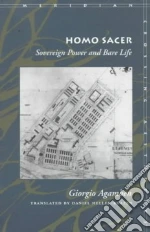 Title :
Homo Sacer
Title :
Homo SacerAuthor: Agamben Giorgio, Heller-Roazen Daniel (TRN) Publisher: Stanford Univ Pr The work of Giorgio Agamben, one of Italy’s most important and original philosophers, has been based on an uncommon erudition in classical traditions of philosophy and rhetoric, the grammarians of late antiquity, Christian theology, and modern philosophy. Recently, Agamben has begun to direct his thinking to the constitution of the social and to some concrete, ethico-political conclusions concerning the state of society today, and the place of the individual within it. In Homo Sacer, Agamben aims to connect the problem of pure possibility, potentiality, and power with the problem of political and social ethics in a context where the latter has lost its previous religious, metaphysical, and cultural grounding. Taking his cue from Foucault’s fragmentary analysis of biopolitics, Agamben probes with great breadth, intensity, and acuteness the covert or implicit presence of an idea of biopolitics in the history of traditional political theory. He argues that from the earliest treatises of political theory, notably in Aristotle’s notion of man as a political animal, and throughout the history of Western thinking about sovereignty (whether of the king or the state), a notion of sovereignty as power over “life” is implicit. The reason it remains merely implicit has to do, according to Agamben, with the way the sacred, or the idea of sacrality, becomes indissociable from the idea of sovereignty. Drawing upon Carl Schmitt’s idea of the sovereign’s status as the exception to the rules he safeguards, and on anthropological research that reveals the close interlinking of the sacred and the taboo, Agamben defines the sacred person as one who can be killed and yet not sacrificed—a paradox he sees as operative in the status of the modern individual living in a system that exerts control over the collective “naked life” of all individuals. € 22,40
|